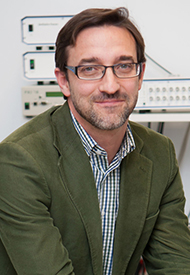News
LATEST NEWS AND EVENTS FROM THE SCHOOL OF ENGINEERING
"Cancer: a guerrilla war".
Carlos Ortiz de Solórzano is Full Professor of Tecnun-School of Engineering of the University of Navarra and researcher of the CIMA

On the occasion of World Cancer Day, we reproduce the article written by Carlos Ortiz de Solórzano, Full Professor of Tecnun and researcher of CIMA, which has been published in several regional media.
"Cancer is a global disease. The laws of statistics, implacable, predict that with a very high probability this disease will affect us. We, or one of our loved ones, will be affected in our lifetime.
Thanks to the generous contributions of many, the encouragement of civil institutions and the work carried out by companies and public and private research organizations, the 20th century has witnessed impressive advances in the knowledge of the causes of cancer. It has also been in the improvement of its diagnosis and treatment, and, consequently, in the length and quality of life of those affected. In these advances, engineering has played a fundamental role in developing new technologies that have made it possible to detect the disease earlier, study it in greater depth and treat it more efficiently.
However, we perceive that the fight against cancer remains an unequal battle. In some ways this is true, for the progress made is small compared to the extent of the disease and the severity of its consequences, both for individuals and societies.
I think that one of the possible reasons for this reality lies in the dispersion of the battle against cancer. Despite the fact that globalization is evident in other aspects of our lives, and despite the clear efforts of institutions to join forces and promote synergies between national and international research groups, the fight against the disease, from the point of view of data management and use, continues to be what is called in the military terminology a "guerrilla war".
In this area of the still "local" struggle, a growing issue of scientific publications show the amazing capability of artificial intelligence methods, encompassed by the term "Deep Learning". They help us to learn and identify patterns in poorly structured clinical data. The use of these methods has allowed the development of pilot diagnostic tools in Anatomy Pathology and Radiology, by means of automatic learning based on a high issue of cases correctly "annotated" by experts. As an example of the potential of these tools, a recent competition (Camelyon 16), showed how Deep Learning based systems are able to detect breast cancer metastases in lymph nodes more accurately than a panel of expert histopathologists.
Similar studies have shown the potential of these systems for the diagnosis of cancerous skin lesions, or for the prediction of cardiovascular disease risk from retinal fundus images. In these cases, the ability of these systems to 'learn' is based on the use of large amounts of information from diverse sources, correctly annotated by specialists.
What is the crux of the matter if the obvious 'partial' victories that have been achieved are to be translated into global progress? Alongside continued efforts to carry out high-quality, adequately funded research, engineering also has a key role to play in this new phase.
I would venture to mention two key issues. On the one hand, the consolidation and correct use of global clinical information, which in turn requires overcoming some legal and cultural barriers that prevent the "socialisation" of clinical data. And secondly, the widespread use of artificial intelligence-based learning tools in clinical settings.
The former requires that clinical information - with the consequent safeguarding of confidentiality - can be easily shared, so that it can be used to train and teach new systems based on artificial intelligence.
The latter requires the awareness of medical professionals. Far from seeing artificial intelligence as a possible "competitor", they should see it as a powerful tool capable of improving the quality of their work. In this way, and thanks to the massive use of information, the globality of cancer would cease to be part of the problem and become part of the solution".

